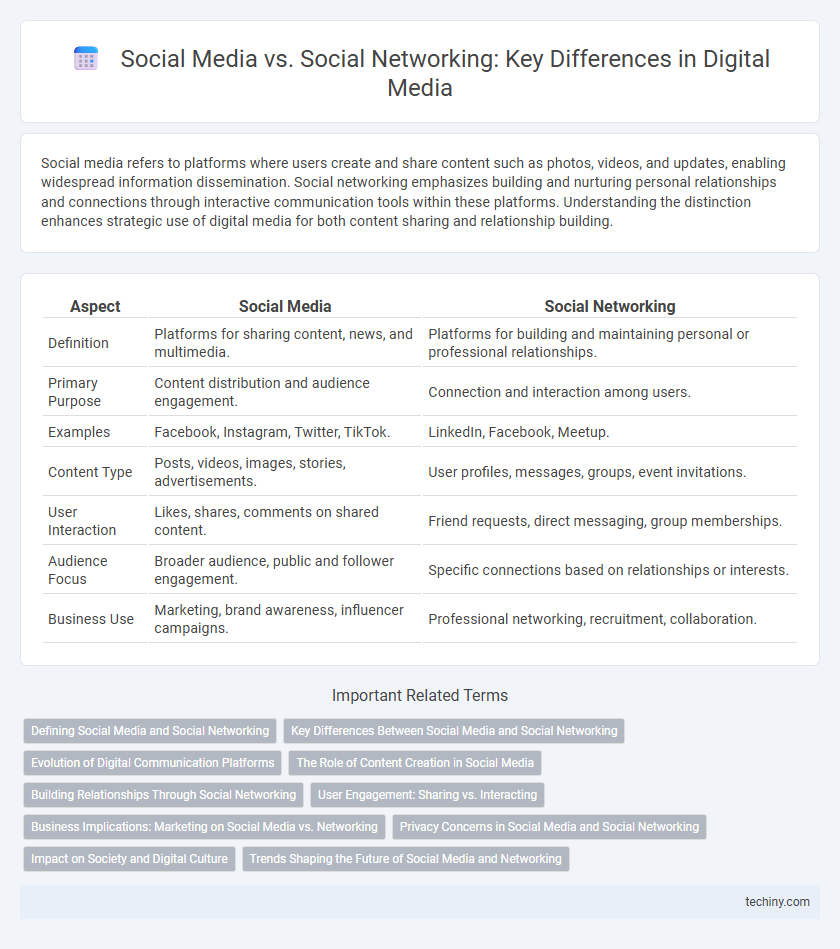Social media refers to platforms where users create and share content such as photos, videos, and updates, enabling widespread information dissemination. Social networking emphasizes building and nurturing personal relationships and connections through interactive communication tools within these platforms. Understanding the distinction enhances strategic use of digital media for both content sharing and relationship building.
Table of Comparison
| Aspect | Social Media | Social Networking |
|---|---|---|
| Definition | Platforms for sharing content, news, and multimedia. | Platforms for building and maintaining personal or professional relationships. |
| Primary Purpose | Content distribution and audience engagement. | Connection and interaction among users. |
| Examples | Facebook, Instagram, Twitter, TikTok. | LinkedIn, Facebook, Meetup. |
| Content Type | Posts, videos, images, stories, advertisements. | User profiles, messages, groups, event invitations. |
| User Interaction | Likes, shares, comments on shared content. | Friend requests, direct messaging, group memberships. |
| Audience Focus | Broader audience, public and follower engagement. | Specific connections based on relationships or interests. |
| Business Use | Marketing, brand awareness, influencer campaigns. | Professional networking, recruitment, collaboration. |
Defining Social Media and Social Networking
Social media refers to digital platforms that enable users to create, share, and consume content such as videos, images, and text. Social networking emphasizes building and maintaining personal and professional relationships through interactive online communities. Both phenomena leverage connectivity, but social media centers on content distribution while social networking prioritizes relational interaction.
Key Differences Between Social Media and Social Networking
Social media platforms primarily serve as channels for sharing content, such as videos, images, and articles, targeting a broad audience to foster engagement and brand awareness. Social networking emphasizes building and maintaining personal relationships through direct interactions and connections with individuals or groups based on shared interests, backgrounds, or professional goals. The key difference lies in social media's content-centric approach versus social networking's relationship-centric focus, shaping user experience and marketing strategies.
Evolution of Digital Communication Platforms
Social media platforms emphasize content creation and sharing, enabling users to broadcast information broadly, while social networking sites prioritize building and maintaining personal connections through interactive communication. The evolution of digital communication platforms reflects a shift from basic social networking functions in early sites like Friendster and MySpace to complex social media ecosystems exemplified by Facebook, Instagram, and TikTok. This transformation highlights increased user engagement driven by multimedia content, algorithmic personalization, and real-time interaction capabilities.
The Role of Content Creation in Social Media
Content creation drives engagement in social media by producing shareable videos, images, and posts that resonate with diverse audiences across platforms like Instagram, TikTok, and Facebook. Unlike social networking, which centers on building relationships and connecting individuals, social media leverages strategic content to amplify brand visibility and influence online behavior. Effective content creation enhances community interaction, boosts user retention, and fuels viral marketing campaigns essential for digital media success.
Building Relationships Through Social Networking
Social networking platforms like Facebook, LinkedIn, and Instagram facilitate building meaningful relationships by enabling users to connect, share experiences, and engage in real-time conversations. Unlike general social media channels that distribute content broadly, social networks emphasize interactive communication and personalized connections that foster trust and collaboration. Leveraging these platforms enhances relationship-building by promoting sustained engagement and community growth through targeted social interactions.
User Engagement: Sharing vs. Interacting
Social media platforms prioritize content sharing, enabling users to distribute photos, videos, and updates to a broad audience. In contrast, social networking sites emphasize interactive connections, facilitating meaningful conversations and relationship-building through comments, messages, and group participation. User engagement on social media is quantified by shares and likes, while social networking engagement centers on dialogue and sustained interactions among users.
Business Implications: Marketing on Social Media vs. Networking
Marketing on social media leverages platforms like Facebook, Instagram, and Twitter to create targeted advertising campaigns, analyze consumer behavior, and boost brand visibility through data-driven strategies. Social networking emphasizes building professional relationships and partnerships on platforms such as LinkedIn, facilitating business development and collaboration. Companies adopting a dual approach effectively combine broad audience engagement with strategic networking to maximize growth and market influence.
Privacy Concerns in Social Media and Social Networking
Privacy concerns in social media and social networking platforms primarily revolve around data collection, user profiling, and unauthorized information sharing. Social media sites often track user behavior extensively for targeted advertising, increasing risks of data breaches and misuse of personal information. Social networking emphasizes interpersonal connections but still faces challenges in safeguarding private communications and managing consent over shared content.
Impact on Society and Digital Culture
Social media platforms like Facebook and Instagram primarily facilitate content sharing and mass communication, shaping digital culture by influencing trends, opinions, and entertainment consumption. In contrast, social networking emphasizes building and maintaining personal and professional relationships, fostering community engagement and support systems. Both dynamics significantly impact society by transforming how individuals connect, collaborate, and express identity in digital spaces.
Trends Shaping the Future of Social Media and Networking
Social media platforms prioritize content sharing, user engagement, and real-time interactions, while social networking sites emphasize relationship-building and professional connections, influencing their evolving functionalities. Emerging trends such as AI-driven personalization, augmented reality experiences, and privacy-focused features are shaping the future landscape of both social media and social networking. The integration of immersive technologies and data analytics is driving enhanced user experiences and innovative marketing strategies within digital media ecosystems.
Social Media vs Social Networking Infographic

 techiny.com
techiny.com